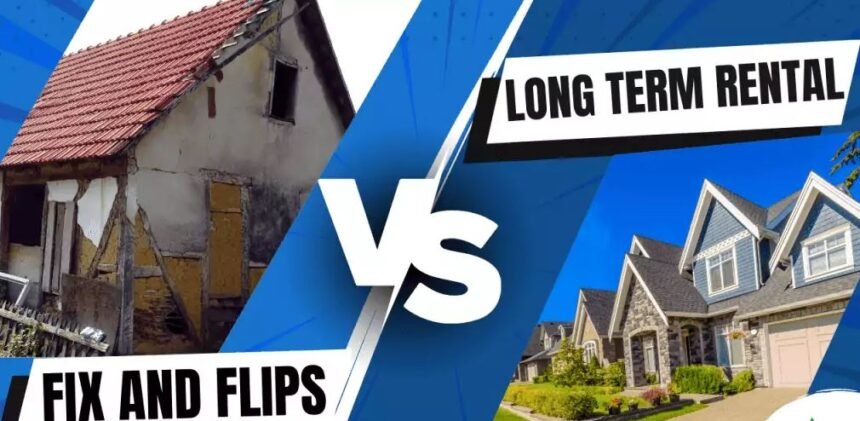You can earn quick money in a short period by investing in the estate. How? Let us elaborate. There are two popular real estate strategies: 1) acquiring rental properties and 2) engaging in fix-and-flop projects. Both have significant pros and cons, along with distinct challenges and financial implications.
Rental properties provide a steady stream of passive income, making them a long-term investment with the potential for property value appreciation over time. On the other hand, fix-and-flip projects offer the opportunity for rapid profit by purchasing, renovating, and reselling properties. Still, they require more hands-on real estate management and carry higher risks. Understanding the differences between these strategies is crucial for aligning your investment goals with the right approach.
This content will give you insight into both strategies; you can conclude which best aligns with your requirements and investment goals.
Why Invest in Real Estate?
Retail investors are increasing in the market due to various factors. Here is why you should invest in real estate;
- The returns on real estate investment are more predictable than bonds and stocks.
- Even in inflation, your rental property will add value to your monthly income.
- A real estate investment will give you equity that you can use later for loans to get hands-on with other projects.
Difference Between Rental Income and Flipping
Rentals are a passive income you receive every month. The income will keep coming no matter what you are doing. However, fix-and-flip requires you to work on a daily basis. You stop working, income stops.
In addition, flipping is not an investment; you need to earn money by working day to day. Though you might not be physically involved in the fixing process, you have to be available for plan approval, analyze budget constraints, buy insurance, etc.
No, we are not trying to keep you away from fix-and-flip. We just want to give you all the insights so you can make an informed decision and consider it a business rather than an investment.
Rental Properties Vs Fix-and-Flip
Rental Properties: A Passive Income
Rental property will not give you a significant upfront income but generate income for years. It is a passive income with the potential to generate good returns and collect the amount on a monthly basis without getting into any fuss.
Pros of Renting a Property
- Being a passive income, a safe amount for all thick and thins
- The right type of rental at the right place and time will increase the value of your property over time
- Some rental properties get tax incentives, unlike flipping
Cons of Rentals
- Risk of not getting desirable tenants and getting rental vacant
- If not managed properly, rentals can be a caveat
The Pros and Cons of Fix-and Flip
Property flipping has its aspects. Besides the benefit of not tying up your capital for long, flipping has a high potential of generating maximum ROI. However, first-timers can have to go through many potholes on the flipping path.
Understanding the pros and cons will help you decide whether to continue with this strategy.
Pros of Flipping
- High-Profit Potential
- Quicker returns on investment
- No fuss about long-term property management
Cons of Flipping
- Market fluctuation can erode profit
- High tax payables
- Time-Consuming
Rental Properties Vs Fix-and-Flip: Which is Best for YOU?
Well, choose the one that best suits your financial goals and available resources, and do not forget risk tolerance.
If you are looking for a passive income with the patience to deal with property management and tenants, choose rental property. However, if you are seeking quick returns and are fine with hands-on involvement in the fixing process, flipping is not at all a bad idea.
Best Strategies to Flip a Property
The ideal situation is when you can grab a property for real estate below market value due to financial distress or any other emergency. You need to keep an eye on the market and benefit from the opportunity.
The other case could be of a fixer-upper. In this case, you need to be prepared for the additional cost required for repairs and staging. Maintenance will increase the value of the property, and your chances of getting a high ROI are confirmed.
What is the expected ROI on flipping houses? Well, it could be 50%- 100%. However, economic fluctuations or other possible conditions can affect the ROI.
TIP: You can use the flips to purchase and hold a high-end rental property.
Wrap Up
Flip-and-fix and rentals are both common real estate investment options. In flipping, people usually prefer buying a property below market value, grooming it, and selling it for profit. As the process interrupts cash flow, you need to have good capital in hand. Meanwhile, rental property meant to be kept on hold will generate monthly income for you. It won’t give you a big quick return like flipping, but it surely is a long-term investment. You can choose any investment option depending on your financial goal and interest.
Do your homework and assess all the possibilities before grabbing any real estate property. An informed decision is better than scratching your head later.
Also Read Capital Smart City Overseas West Block.





